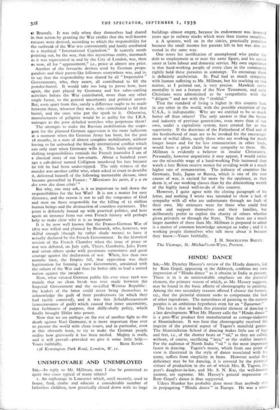UNEMPLOYABLE AND UNEMPLOYED SIR, —In reply to Mr. Millman, may I
also be permitted to quite two cases typical of many others?
1. An orphanage in Lancaster which, until recently, used to house, feed, clothe and educate a considerable number of fatherless children, now practically closed down with its large buildings almost empty, because its endowment was invested years ago in railway stocks which were then trustee securities.
2. A spinster, well on in the sixties, practically penniless because the small income her parents left to her was also in- vested in the same way.
One notes his justification of unemployed who prefer the dole to employment at or near the same figure, and his covert sneer at farm labour and domestic service. My own experience is that hard-working people of every class in the community rightly hold these parasites in contempt. To encourage them is definitely unchristian. St. Paul had as much sympathy with human suffering as Mr. Millman, but his teaching on this matter, as I pointed out, is very precise. Mawkish senti- mentality is not a feature of the New Testament, and early Christians were admonished to be sympathetic with the " diligent " and not with the " slothful."
That the standard of living is higher in this country than in any other in the world, with the possible exception of the U.S.A., is indisputable. Why are we entitled to be so much better off than others? The only answer is that the brains and industry of previous generations, even more than of our own, under a capitalistic system, have created for us this superiority. If the doctrines of the Fatherhood of God and of the brotherhood of man are to be invoked for the encourage- ment of wilful idlers, surely those who are working for much longer hours and for far less remuneration in other lands, would have a prior claim for our sympathy to these. Mr. Millman is evidently a believer in insular Christianity. Personally, however unpatriotic it may appear, I would rather see the miserable wage of a hard-working Pole increased than watch a lazy Briton receive money for avoiding work at a much higher rate of remuneration. The jealousy of countries like Germany, Italy, Japan or Russia, which is one of the root causes of war, is excited far more by the opulence, as they deem it, of our working classes than by the diminishing wealth of the highly taxed well-to-do of this country.
However, I quite agree with the closing paragraph of his letter, and nothing I wrote was intended to show a lack of sympathy with all who are unfortunate through no fault of their own. My strictures were for those who could find work and support themselves and their families, but deliberately prefer to exploit the charity of others whether given privately or through the State. That there are a much larger number of these than Mr. Millman is prepared to admit is a matter of common knowledge amongst us today ; and it 1, working people themselves who talk most about it because they know.—Yours faithfully,


































 Previous page
Previous page